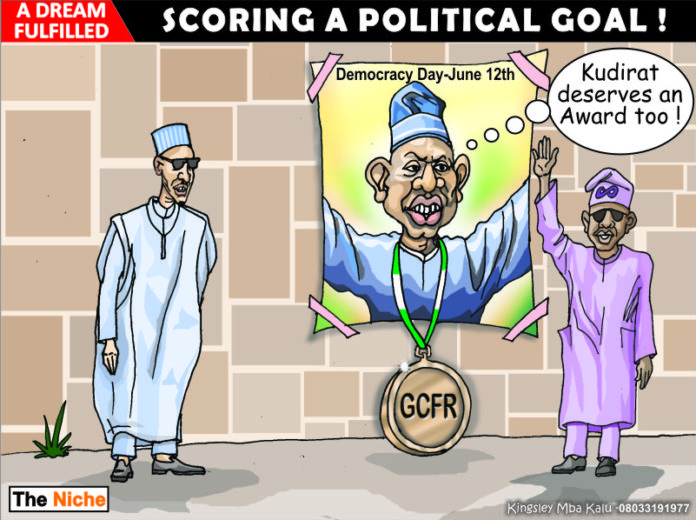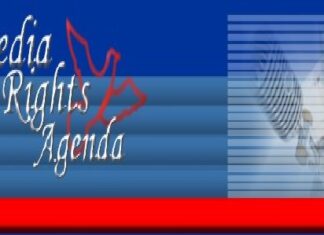Today, exactly a quarter of a century ago, Nigerians banished their country’s debilitating primordial fault-lines of religion and ethnicity into the dustbin of history.
On June 12, 1993 the electorate trooped out en masse to give Bashorun MKO Abiola the mandate to superintend over the affairs of the country.
It was unprecedented.
Abiola, a Muslim, who ran on the ticket of the now defunct Social Democratic Party (SDP) had a running mate, Ambassador Babagana Kingibe, also a Muslim.
Yet, the SDP Muslim-Muslim ticket of Abiola and Kingibe defeated that of Alhaji Bashir Tofa, the now defunct National Republican Party’s candidate who had on the NRC ticket, Dr. Sylvester Ugoh, a Christian from the South East.
The annulment of the poll adjudged both locally and internationally to be free and fair by the military president, General Ibrahim Babangida, threw the country into political cataclysm from which it is yet to fully recover.
Abacha’s five-year rule foisted on Nigerians a full-blown dictatorship and made the country a pariah among the comity of nations.
The death of Abiola while still in the custody of the federal government led by General Abdulsalami Abubakar on July 7, 1998 and the eventual transition to a civilian rule on May 29, 1999, did not douse the clamour for a mitigation of the historical injustice of June 12.
Ironically, the agitation was mostly ignored by Presidents Olusegun Obasanjo, late Umaru Yar’Adua and Goodluck Jonathan.
That such a mitigation is coming from the unlikeliest of quarters – President Muhammadu Buhari – remains a puzzle to many.
But the president’s unexpected declaration on Wednesday, June 6, that June 12, henceforth, will become the new Democracy Day has elicited an excitement that is yet to be seen in his three-year presidency.
As Prof Humphrey Nwosu, the chairman of the defunct National Electoral Commission (NEC) that conducted the poll said on Monday, the pronouncement “marked a turning point in Nigeria’s tortuous journey towards a democratic polity.”
The president in a press statement he personally signed said Nigerians believe that “June 12, 1993, was and is far more symbolic of democracy in the Nigerian context than May 29, or even October 1.”
He equally awarded posthumously the highest honour of Grand Commander of the Federal Republic (GCFR) to Abiola and Grand Commander of the Order of the Niger (GCON) to Kingibe and late Chief Gani Fawehinmi, an indefatigable human rights lawyer who worked till his death to ensure the actualisation of the June 12 mandate.
The commemoration and investiture is taking place today, the 25thanniversary, at the Nigeria’s seat of power in Abuja.
It is instructive that Nigerians from all works of life and from across political divides are hailing President Buhari.
While some have interrogated the motive, concluding that it was a political masterstroke to garner votes in the 2019 polls, the preponderance of public opinion is that the president has righted a historical wrong.
The Niche strongly aligns itself with this view.
The issue of legality as raised by former Chief Justice Alfa Belgore who was chairman of the 2016 national honours committee can be sorted out with the co-operation of the National Assembly which has already thrown its weight behind the move.
While we agree with Justice Belgore’s postulation that going by the precepts of the 1964 National Honours Act, only soldiers or other servicemen could be awarded posthumous medals for their bravery and therefore national honours are only for the living, we disagree with his conclusion that the only thing that could be done in the circumstance is to name a national monument after Abiola.
For there to be a closure to the regrettable June 12 saga, the steps taking by President Buhari are necessary.
But it will be self-defeating if the only reason Buhari has done this is to gain political mileage in next year’s elections as some people claim.
Above all, the president’s symbolic gesture must also rekindle the spirit of free and fair elections, peace, unity and transcendental leadership which were all embedded in the June 12 saga.
If this move succeeds in expanding the frontiers of democracy in Nigeria, regardless of ethnic group, and helps in providing economic, social and developmental benefits that will make Nigeria the great nation it is destined to be, then it will be worthwhile.













